Solidarity for refugees: Whoever, wherever, whenever

There is nothing to celebrate on World Refugee Day. A record 100 million people are currently displaced around the world. Without political will to address the root causes of the multiple refugee crises, most of the individuals and families who were forced to flee their homes have little possibility of returning.
Almost one million of these refugees live in Bangladesh's Cox's Bazar. Most of them have been living here now for almost five years. For them to return home voluntarily, safely and sustainably, some key conditions in Myanmar need to be ensured: security, access to essential services, housing, livelihood opportunities, and other fundamental human rights, including freedom of movement and restoration of citizenship.
UNHCR, the UN refugee agency, together with other humanitarian partners, is present in Myanmar, including in Rakhine state, where we are trying to contribute to the creation of these conditions so people can safely return home. However, we cannot avoid reality. Current developments in the country, including in Rakhine state, show that the situation remains fluid and much work still needs to be done. The root problems that led to the persecution and violence against the Rohingya people in 2017 still need to be addressed. Just as in many other crises, the international community must redouble efforts to resolve existing conflicts and work collectively to invest in political dialogue, enhance diplomatic engagement and support and strengthen humanitarian and development interventions to build the road towards safe returns. This will also prevent future displacement.
Only 51 years ago, some 10 million Bangladeshi refugees were uprooted from their families and lives during the Liberation War. Today, Bangladesh is a rapidly developing country that has received Rohingya refugees and saved their lives. In contrast to the Bangladeshi refugees who could return home within a year, Rohingya refugees continuously tell me that while they would want nothing more than to return home, they fear that as long as they are not granted access to rights, essential services, proper documentation, and justice is not served at home, their lives would be at risk if they went back today.
While Rohingya refugees remain in Bangladesh, they are still dependent on life-saving assistance. The government, humanitarian and development agencies, and local organisations must sustain this support, but also invest in the refugees' education, development of their skills, and livelihood opportunities, as this will facilitate reintegration when they can safely return home and help the long-term recovery and reconstruction of their communities in Myanmar. Providing Rohingya refugees with education through the Myanmar curriculum and with portable skills through training programmes will contribute to their voluntary return and the sustainability of their reintegration at home. This will also contribute to their safety and well-being in the camps, as it enables them to maintain purposeful and productive lives, while keeping their hope for a brighter future alive.
The government-led project on Bhasan Char, where more than 30,000 Rohingya refugees have been relocated to date, provides life-saving assistance and bolsters their resilience through education, skills development and livelihood opportunities. With the support of UNHCR and other UN agencies, local NGOs are providing opportunities to develop skills and access to livelihoods such as agriculture, fishing or tailoring. Gains made in livelihoods on Bhasan Char can equally be applied to the camps in Cox's Bazar, taking into account the specificities of each location.
Essential services in the camps have come a long way, and an environmentally responsible and strong climate action strategy has restored the greenery across the camps. However, for this to be maintained, we must ensure that alternative energy sources to firewood continue to be provided, notably liquefied petroleum gas (LPG), for households in the refugee camps and the Bangladeshi communities that host them. Additionally, we must enhance the capacities of both communities to prepare and respond to natural hazards, such as flooding, landslides and fires.
With multiple humanitarian crises in the world, notably in Afghanistan and Ukraine, there is a serious risk that political and financial support for the Rohingyas in Bangladesh could decrease considerably. We must make a concerted effort to maintain interest and backing by continuing to highlight the needs of the Rohingyas. We must show that our response is well-coordinated, effective, and critical. We must encourage and support the leadership of local actors – authorities, aid organisations, civil society – that are instrumental in the response, and whose resources and capacities should be fully appreciated and enhanced. We must also diversify funding, and continue strengthening partnerships with donors, international financial institutions and the private sector, who can contribute notably in the areas of youth and women empowerment, skills development and livelihood opportunities.
International solidarity towards Bangladesh and Rohingya refugees is needed now more than ever. No one chooses to be a refugee. Today, on World Refugee Day, I appeal for solidarity and continued support for Rohingya refugees, and encourage collective action to allow them to return to and have a brighter future in Myanmar.
Johannes van der Klaauw is the representative of the United Nations High Commissioner for Refugees (UNHCR) in Bangladesh.

 For all latest news, follow The Daily Star's Google News channel.
For all latest news, follow The Daily Star's Google News channel. 



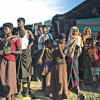
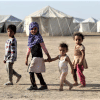
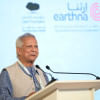
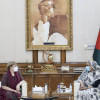
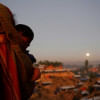


Comments